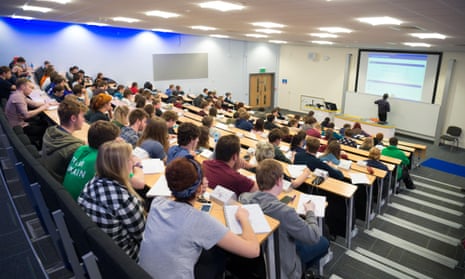Theresa May has been warned against damaging disadvantaged students’ access to university in order to fund a tuition fees cut that has been described as “a sop to classic Tory voters”.
The prime minister is under pressure to rule out allowing universities to loosen their obligations to widen participation as part of a long-awaited review of higher education funding to be unveiled on Monday.
She is also facing calls to back away from a flat cut to maximum fees, which would benefit higher-earning graduates. Cutting maximum fees from £9,250 a year to £6,000 would take more than £3bn a year away from universities, according to consultancy London Economics. Analysts argue such a cut would benefit well-off graduates the most, as lower earners do not pay back their full loan.
May announced her intention to hold an independent review last year. However, it is understood that the idea was opposed by the then education secretary Justine Greening and universities minister Jo Johnson, who wanted faster action on higher maintenance grants and lower student-loan interest rates. Both were moved from their jobs as part of last month’s reshuffle.
David Laws, the former Lib Dem education minister who now runs the Education Policy Institute, said the opportunity to fix “the real deficiencies in post-18 education funding should not end up being a sop to classic Tory voters, who pay the existing high level of fees”.
“We know from what ended up happening to Justine Greening that there was previously a lot of concern at the Department for Education that this review is simply about pouring additional money into trying to buy off the student vote that the Tories have lost – and it would end up being a large subsidy to people who already do well out of the tertiary education system,” he said.

“Fairer funding is needed for the 50-55% who don’t go to university at all – and get a pretty bad deal.”
Les Ebdon, director of the Office for Fair Access, is among those calling for university programmes designed to widen access to disadvantaged groups to be retained. There have been suggestions that universities could be allowed to cut some of the programmes to soften the financial blow of lower fees.
Concerns surrounding tuition fees come as an influential cross-party group of MPs calls on May to consider a cut in the interest rates charged on student loans and a return to maintenance grants. Nicky Morgan, the former education secretary, who now chairs the Treasury select committee, said that the use of high interest rates on student loans – currently set at 6.1% – was questionable.
“No other persuasive explanation has been provided for why student-loan interest rates should exceed those prevailing in the market, the government’s own cost of borrowing, and the rate of inflation,” she said. “The government must reconsider the use of high interest rates on student loans as part of its review.
“The government has said that maintenance loans aren’t intended to fully cover a student’s living costs. If a student can’t access additional sources of income, they may be priced out of university. The government should assess the case for reintroducing maintenance grants to help remove barriers to access.”
While the committee does not back a cut to tuition fees, it calls on the government to explain why the vast majority of universities have adopted the maximum of £9,250 a year, despite initial hopes that institutions would offer different prices.








